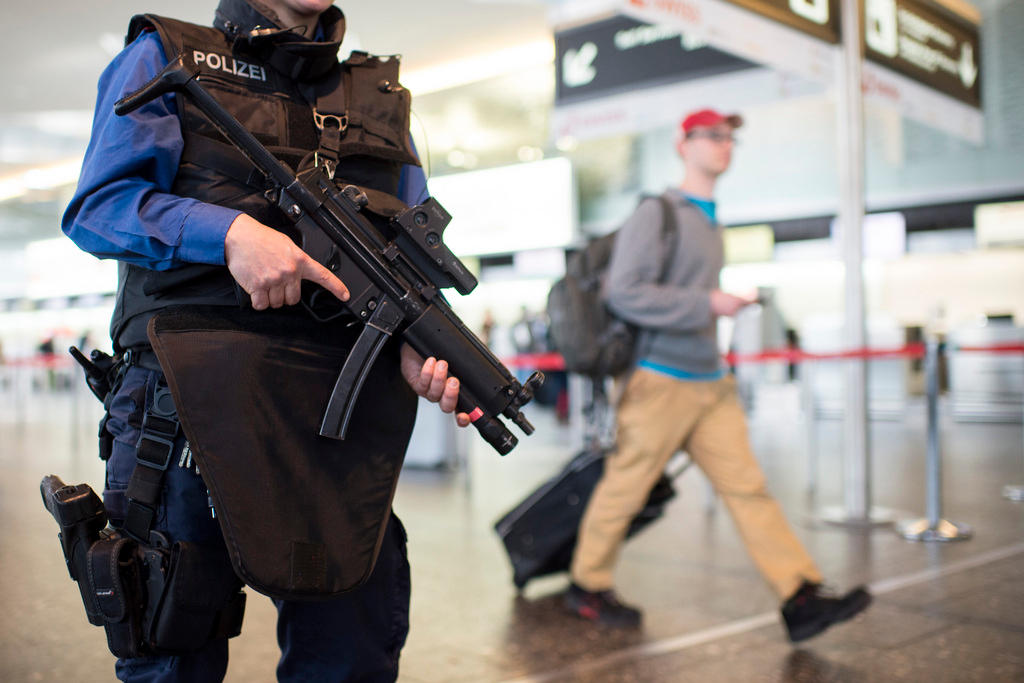Is Switzerland prepared for terrorism?

An increasing number of large and well-known Swiss companies are insuring themselves again terrorism: Swiss Federal Railways, major airports and even the Zurich Opera House. Switzerland itself, however, doesn’t have a government solution for major damages.
In the view of Switzerland’s intelligence service, the country is not a primary target of jihad terrorism because it is not taking part in the military battle against the Islamic State (IS). Nevertheless, the danger of terrorism has also increased here since the terror attacks on Paris, Nice and Brussels.
Terrorism is not only a human disaster but a financial one as well: the September 11 terror attacks in the United States cost insurance companies $37 billion (CHF39 billion). Insurers consequently cancelled all agreements and refused to insure terrorism risks going forward. The state had to intervene, forcing insurers by law to cover terrorism risks. The government, in turn, agreed to a joint liability of $100 million to $100 billion.
Other countries such as Germany, France, Belgium, the United Kingdom and Israel have also introduced so-called pool solutions in which insurance companies reinsure risks together with the government. For example, Belgium’s terrorism risk insurance programme, organised by the government, works in the following way: insurers pay for damages of up to €300 million (CHF324 million); reinsurers cover damages that exceed that sum up to €700 million; and the government is responsible for the rest of damages up to €1 billion.
No Swiss pool
This is not the case in Switzerland. There is no governmentally organised pool solution here – only a voluntary reinsurance platform for terror risks. So would a terror attack on a Swiss train station, airport, nuclear power plant or supermarket lead to a financial disaster above and beyond the human tragedy?
Switzerland’s federal government doesn’t see such a risk. “On the basis of experience, we can observe that as a rule purchasing terrorism coverage in Switzerland is not an issue,” the Swiss finance ministry wrote in response to a query from swissinfo.ch.
In principle, this conclusion is correct: basic insurance normally covers up to CHF10 million ($10.1 million) in terrorism-related material damages and business interruption. And there is extra coverage if this is not sufficient. AXA Winterthur has some 130 customers with additional coverage, while Mobiliar has 150 and Helvetia nearly 250. Swiss Federal Railways, the Zurich and Basel Mulhouse airports, as well as the Zurich Opera House all have extra coverage, for example. Nuclear power plans are even legally obligated to have coverage.
Not all large companies, however, have taken similar steps. Supermarket chains Migros and Aldi Suisse do not have any special terrorism coverage nor do they have any such plans at the present time. “Up to now, we have not found any need for special terrorism insurance,” said a Migros spokesman. Rival Coop, which declined to disclose any information “for security reasons”, does say it has adequate financial resources. Another supermarket chain, Lidl, believes it is adequately protected.
Insurers are naturally more sceptical. “In truth, the risk is inherently underestimated,” Helvetia wrote in response to a question whether certain companies and industries – supermarkets, for example – are inadequately insured in terms of terrorism. AXA Winterthur explains: “There are no numbers or market evaluations regarding whether all businesses at risk actually have terrorism insurance. “ Terrorism coverage for customers with exposed locations, such as large department stores, sport stadiums, train stations and airports is worthwhile, according to AXA Winterthur.
Insurance companies don’t want a pool solution
But what about the insurance companies? After all, pool solutions are also supposed to protect them from ruin.
Insurers are not afraid. “The consequences stemming from a terror attack are normally bearable for healthy insurance companies,” AXA Winterthur writes. In its view, only dozens of large events in the same year would lead to problems.
Helvetia notes that floods and earthquakes, for the most part, cause greater damage than terror attacks. “The insurers have shown in the past that they can deal financially with such large catastrophes.”
And Professor Martin Eling of the Institute for Insurance Economics at the University of St Gallen confirms that “a terror attack does not have as large financial and economic impacts as natural disasters”. It takes an extraordinary incident for companies and insurers to run into difficulty.
The introduction of a government pool solution is not a topic of discussion for either the insurers surveyed by swissinfo.ch, the Swiss Insurance Association or the federal government. When questioned when the government would need to step into the breach and whether bailouts via emergency laws, as in the case of the banking crisis, would be necessary, the Swiss finance ministry responded as follows: “These questions concern hypothetical events. In a concrete case, the responsible authorities would need to evaluate the situation and make corresponding decisions.”
On the whole, Swiss companies and insurers are presumably protected financially against terrorism. If not, past experience shows the state would likely step in.
Should the government provide financial assistance for damages caused by terror attacks? Join the discussion in our comments section below.
You can also contact the author on Facebook and Twitter @SibillaBondolfi.
Terrorism protection for nuclear power plants
In Switzerland, the owners of nuclear power plants face unlimited liability for damages from terror attacks. They are legally required to have liability insurance with a coverage level of CHF1 billion currently and CHF1.8 billion in the future. The coverage is insured through the Swiss Pool for the Insurance of Nuclear Risks, as well as the federal government’s nuclear damage funds. Whether coverage would be sufficient in the event of an enormous catastrophe, such as Chernobyl, is disputed.
Translated from German by Catherine McLean

In compliance with the JTI standards
More: SWI swissinfo.ch certified by the Journalism Trust Initiative












You can find an overview of ongoing debates with our journalists here . Please join us!
If you want to start a conversation about a topic raised in this article or want to report factual errors, email us at english@swissinfo.ch.